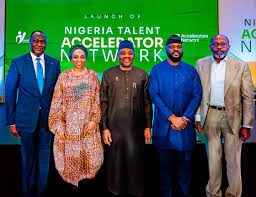Nigeria has launched the Nigeria Talent Accelerator Network under the World Economic Forum’s Reskilling Revolution to strengthen workforce capabilities, address productivity gaps, and prepare citizens for the future of work.
The initiative brings together government, private sector, academia, and civil society to co-create scalable solutions for reskilling and upskilling Nigerians, focusing on digital, green, and transferable skills that will align education with labour market demands and position the country as a competitive global talent hub. Co-chaired by the Federal Ministry of Industry, Trade and Investment and the Federal Ministry of Education, and coordinated by the National Talent Export Programme (NATEP), the Accelerator marks Nigeria’s entry into the World Economic Forum’s Global Accelerators Network.
Speaking at the launch, Minister of Industry, Trade and Investment, Dr Jumoke Oduwole, described the initiative as “a decisive step towards building a globally competitive workforce that can power Nigeria’s next phase of industrialisation and innovation.” She noted that the platform will “connect policy, industry, and education” to drive employability, productivity, and inclusive economic growth.
Minister of Education, Dr Maruf Alausa, reaffirmed the Ministry’s commitment to aligning education and vocational training with labour market needs. “We are ensuring that Nigerian youth are equipped with future-ready skills that make them competitive globally,” he said.
National Coordinator of NATEP, Teju Abisoye, explained that the Accelerator will foster collaboration among key stakeholders to co-design and scale workforce solutions. “Through this collaboration, Nigeria is not only preparing for the future of work but also helping to define it. We are developing a coordinated action plan to address talent gaps and leverage opportunities for talent export,” she said.
The initiative will prioritise reskilling and upskilling in areas critical to emerging sectors such as technology, business process outsourcing, and green industries. It will also mobilise public-private partnerships to fund and scale workforce development programmes, enabling Nigerians to transition into high-demand roles while creating data-driven systems to anticipate future skills needs.
Managing Director of the World Economic Forum, Saadia Zahidi, commended Nigeria’s leadership in advancing skills development. “By investing in human capital, Nigeria is positioning itself not only to meet domestic workforce needs but also to contribute talent and innovation to the global economy,” she said.
Nigeria’s participation in the Reskilling Revolution underscores its commitment to human capital development, digital inclusion, and innovation-driven growth. The Accelerator complements national reforms aimed at diversifying the economy, deepening the innovation ecosystem, and promoting broad-based prosperity.
The World Economic Forum’s Reskilling Revolution seeks to provide better education, skills, and economic opportunities to one billion people globally by 2030.
The National Talent Export Programme (NATEP), established to position Nigeria as a global hub for service exports and talent sourcing, aligns with President Tinubu’s job creation agenda, which targets the generation of one million in-demand jobs within five years.
Beyond employment creation, NATEP is expected to attract foreign exchange through talent exports, generate tax revenue for state governments, and drive sustainable economic growth through innovation and trade in services.










